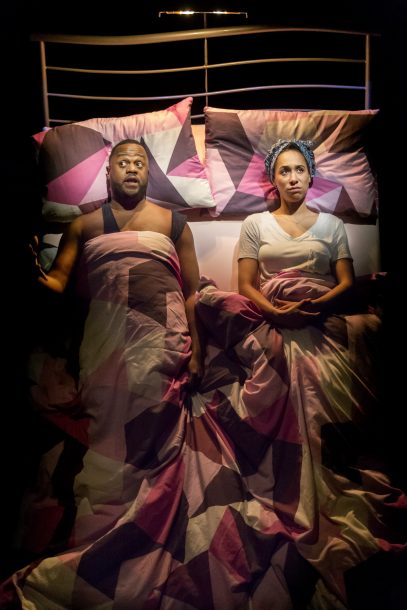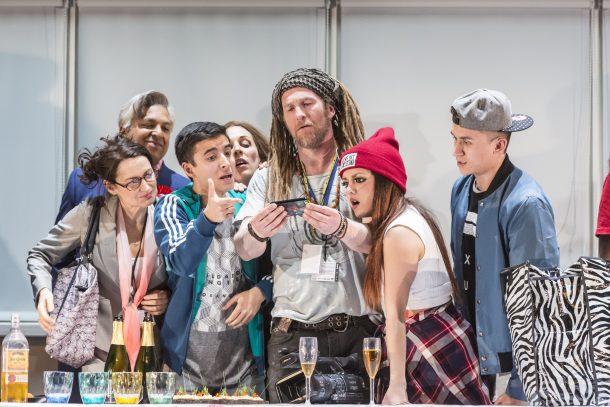I attended this performance the day following BREXIT, which resulted in the United Kingdom from a nationwide vote (England, Wales, Ireland, Scotland, Northern Ireland, and Gibraltar) taken on 23 June 2016, found London in the midst of a political, social and economic spectacle. The vote, made possible by a 51–49% “yes” margin, paved the way for England to potentially leave the European Union and embrace a questionable social and economic future. In the midst of this event the Royal National Theatre’s production of The Suicide gained major relevance as it presented a story that related to working class individuals and the economic realities of the early twenty-first century. Based on the 1928 Russian play by Nikolai Erdman and dramatized for the contemporary stage by Schaula El-Bushna, The Suicide was yet another incredibly successful production by the RNT that managed to reimagine the ideas of classical and modern texts into contemporary society. El-Bushna managed to translate Erdman’s text into the world of internet and social media in a way that both served the text and the play’s message.
One of the most notable issues about the 24 June performance was the actual audience breakdown. A visual overview of the audience revealed an audience percentage of about seventy percent of patrons in the “under age thirty bracket,” with the remaining thirty percent in the age forty and above age group. Discussions with the box office staff after the show revealed that the Royal National Theatre has continually addressed the mission to bring a younger audience to the theatre and to present works that appeal to a younger audience base. This was clearly the case with The Suicide, a perfect example of a work that addressed ideas and subject matter geared towards a twenty-first century audience given the style of production, updated contemporary language and references, and the use of video and mediated situations.
The Erdman work was greatly enhanced by the inclusion of video, live time video and a score provided by a live rock group. Directed by veteran London director Nadia Fall, as presented by the Royal National Theatre in 2016, it gained incredible relevance both in terms of its relation to contemporary social and political issues as well as its depiction of contemporary delivery of media and social perception as defined by media-based platforms.

The Suicide by Suhayla El-Bushra, after Erdman. Directed by Nadia Fall. Pictured: Javone Prince (Sam) Rebecca Scroggs (Maya). Photo: Johan Persson.
The Suicide dealt with the central character Sam Desai (played by Javone Prince), an unemployed member of the working class unable to achieve employment of any substantive kind. Somewhat misled by the possibilities made available in contemporary society—he thinks to have secured employment as a “mystery shopper” for restaurants and other locations—Sam initially clashes with his girlfriend Cleo (Ayesha Antione) who berates him for his unrealistic aspirations. This leads Sam to announce on Facebook that he will be taking his own life due to the fact that he has been “failed by society.” The announcement goes viral as Sam’s post gets nearly eight million hits and Sam is approached by several media companies and offered funding as the media decides to sensationalize the event and accentuate the political nature of Sam’s plight. Sam’s planned suicide creates a viral sensation that amasses millions of followers and starts a movement that promotes political and social messages, showing an appeal that was as relevant in 1928 as in 2016. Councilor Brian Dawes, played by Pal Aron, was a central figure in the work and well represented by this actor. Dawes was forced to make a public acknowledgement that society had indeed failed Sam and similar individuals. In order to save face, the Dawes figure went on television and proposed sweeping reforms to improve the situation. Sam’s case, however, had come too late and the money and interest “invested” in his suicide made the ultimate event inevitable.
The design team of Ben Stones, Andrzej Goulding and Paule Constable developed a stunning visual palette of images. Video sequences, many created in a “cartoon-like” format, elevated the work’s style to a contemporary form bordering on expressionism. This term seems to be the most appropriate since the moments created by the videos took the audience into the character’s minds in a way that, when combined with the heavily percussive rock score, landed in a world reminiscent of Pink Floyd’s The Wall many years earlier. The rock score propelled the work vigorously and the key scenes included film crews, live television interviews with the soon to be dead Sam, a barrage of selfies and internet posts, as well as self tapes of messages from the “would-be suicide committer” himself, thrust this work into the midst of everything that is the 2016 craze for social media.
A key element in the 24 June production was its take on contemporary politics, including some relevant commentary on BREXIT and the resignation of Prime Minister David Cameron with the resultant installation of Theresa May. The production inserted the names of these figures as well as the name Boris—a reference to former London mayor Boris Johnson—who was also mentioned by name several times in the production. The inclusion of contemporary political issues and London-based political figures was stretched to the extreme as Sam fell into a drug-induced sleep and imagined himself in heaven. There, with Margaret Thatcher as God, Sam recounted his life on earth as he and Maggie discussed the political and social difficulties on earth during the twenty-first century. With many references to “Boris” and “Nicholas,” the British audiences were enthralled by the contemporary inclusion of British politics into the daily life of the National Theatre.

The Suicide by Suhayla El-Bushra, after Erdman. Directed by Nadia Fall. Photo: Johan Persson.
Musical numbers inserted into the text rapped lyrics about “the revolution,” while contemporary references included a staged drinking game, the iPhone taping of a speech by Sam regarding his plight, political speeches given by Dawes and others who chose to take a stand on the viral nature of the “suicide” campaign as well as Dawes’ taking of a “selfie” beside a dead body. The overall scope of the performance style was one that embraced the entirety of the twenty-first century visual culture and landscape as related to social media and internet culture.
The National Theatre’s production of The Suicide managed to embrace all of the technology in a meaningful way that actually supported the text in a very vital manner. The political relevance of the work, especially given the timing of BREXIT, was literally uncanny and could not have been better timed. The youthful exuberance displayed both onstage as well as throughout the audience proved that the London theatre community has clearly addressed its desire to ensure the survival of theatre in the twenty-first century as well as its desire to preserve classic plays as revealed in contemporary formats.
The Suicide. By Schaula El-Bushna. Based on the 1928 Play by Nikolai Erdman. Lyttleton Theatre, Royal National Theatre of Great Britain. 24 June 2016.
Steve Earnest is a Professor of Theatre at Coastal Carolina University, having received a PhD in Theatre from the University of Colorado, Boulder and an M.F.A. in Musical Theatre from the University of Miami, Florida. Dr. Earnest has published articles, reviews and interviews in Theatre Journal, Western European Stages, Backstage West, Ecumenica, The Journal of Beckett Studies, Theatre Symposium, New Theatre Quarterly, and Theatre Studies, among others. In 1999 he published a book entitled The State Acting Academy of East Berlin and is currently working on projects dealing with the theatre system of Iceland.
European Stages, vol. 8, no. 1 (Fall 2016)
Editorial Board:
Marvin Carlson, Senior Editor, Founder
Krystyna Illakowicz, Co-Editor
Dominika Laster, Co-Editor
Kalina Stefanova, Co-Editor
Editorial Staff:
Cory Tamler, Managing Editor
Mayurakshi Sen, Editorial Assistant
Advisory Board:
Joshua Abrams
Christopher Balme
Maria Delgado
Allen Kuharsky
Bryce Lease
Jennifer Parker-Starbuck
Magda Romańska
Laurence Senelick
Daniele Vianello
Phyllis Zatlin
Table of Contents:
- The 70th Avignon Festival: An Experiment In Living Together by Philippa Wehle
- The 2016 Berlin Theatertreffen: Is Half a Festival Better Than None? by Marvin Carlson
- Introduction au Kunstenfestivaldesarts de Bruxelles 2016 by Manuel García Martínez
- The Fidena Festival, 2016 by Roy Kift
- The Noorderzon Festival in Groningen by Manuel García Martínez
- Review of The Suicide by Steve Earnest
- Spain: Runaway Hits and Ephemeral Memorabilia by Maria M. Delgado
- The Seagull: An Idea for a Short Story by Emiliia Dementsova
- Billy Elliot The Musical at the Hungarian State Opera by James Wilson
- Chorus of Orphans: A Theatre Séance by Poland’s Teatr KTO, Kraków by Jacob Juntunen
- Theatre More Arresting than Ever: A Conversation with Dorota Masłowska by Krystyna Lipinska Illakowicz
Martin E. Segal Theatre Center:
Frank Hentschker, Executive Director
Marvin Carlson, Director of Publications
Rebecca Sheahan, Managing Director
©2016 by Martin E. Segal Theatre Center
The Graduate Center CUNY Graduate Center
365 Fifth Avenue
New York NY 10016




